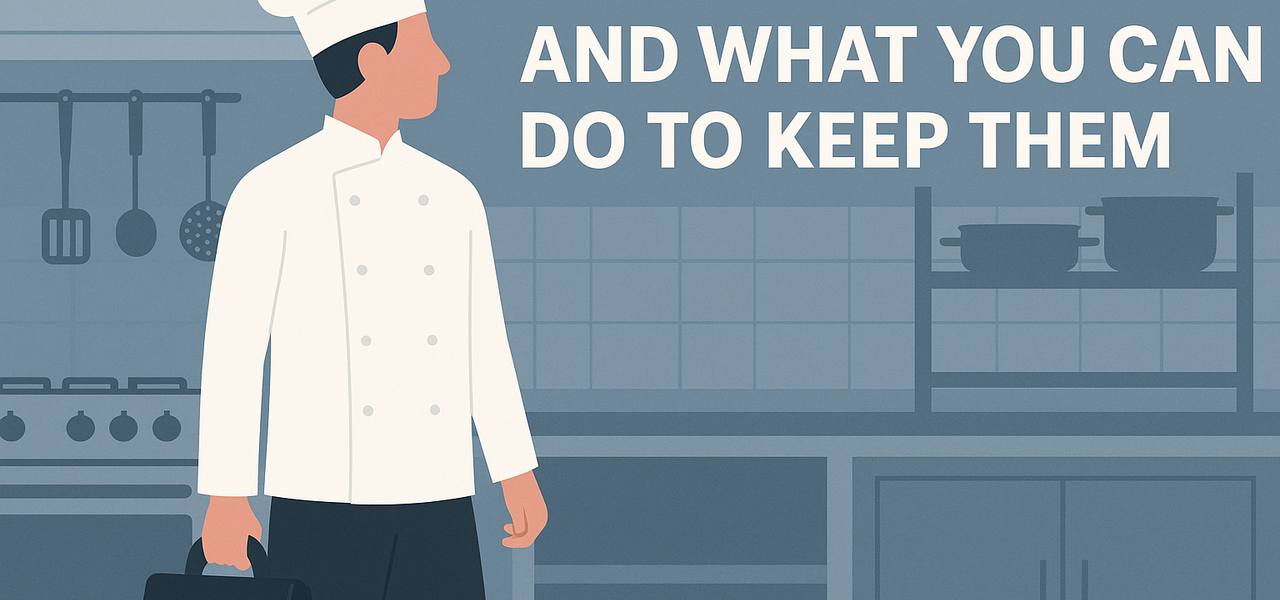Chefs are the heartbeat of any hospitality business. But right now, they’re walking out the door in worrying numbers. In fact, hospitality has one of the highest staff turnover rates in the UK — and chef roles are among the hardest hit.
So why are chefs leaving? And what can employers do to stop the churn and keep their kitchens thriving?
Let’s explore the main reasons chefs quit — and what you can do today to build loyalty, boost morale, and retain your most valuable team members.
📉 The Top Reasons Chefs Leave
1. Burnout & Long Hours
Chefs often work long, irregular hours under intense pressure. Over time, this leads to physical exhaustion and emotional fatigue. Burnout is a major factor behind early exits from the industry.
"I love cooking, but the 60-hour weeks with no breaks? That’s not sustainable."
2. Poor Work-Life Balance
Unpredictable shifts, split rotas, and late nights make it difficult for chefs to maintain any kind of life outside work. Many leave for roles in other sectors that offer more structure and flexibility.
3. Lack of Recognition
When hard work goes unnoticed, motivation drops. Chefs who feel undervalued are more likely to seek out kitchens where their efforts are appreciated.
4. No Clear Progression
Many chefs leave because they can’t see a path forward. If promotions, training, or development opportunities aren’t clear, they’ll look elsewhere.
5. Toxic Kitchen Culture
Bullying, aggressive leadership, or chaotic management still exist in some kitchens. Talented chefs won’t tolerate poor culture for long.
6. Better Offers Elsewhere
With chef shortages across the UK, talented professionals are in high demand. If your competitor offers better pay, hours, or culture, it’s easy to lose good staff.
📈 What You Can Do to Improve Chef Retention
1. Create Sustainable Rotas
Balance workloads and avoid excessive hours. Introduce set days off and plan rotas well in advance so chefs can plan their lives.
- Use software to streamline shift planning
- Ensure full-time staff don’t exceed agreed hours
- Build in breaks and recovery days during peak seasons
2. Offer Competitive Pay & Benefits
Pay alone won't retain chefs — but being underpaid will definitely drive them away.
- Benchmark salaries against similar businesses
- Include perks like paid breaks, team meals, or travel support
- Consider retention bonuses after 12 months
3. Recognise & Reward Hard Work
Say thank you. Celebrate wins. Make your chefs feel seen.
- Shout out staff achievements publicly
- Introduce employee of the month schemes
- Provide regular feedback and appreciation
4. Invest in Training & Development
Give your chefs a reason to stay by helping them grow.
- Offer short courses or paid upskilling sessions
- Promote from within where possible
- Set clear progression paths from day one
5. Foster a Positive Kitchen Culture
Create an environment that people want to be part of.
- Zero tolerance for bullying or shouting matches
- Train managers in leadership and communication
- Encourage teamwork, mentoring, and inclusivity
6. Conduct Stay Interviews
Don’t wait until people leave to find out why. Ask them while they’re still with you.
- What do they love about working here?
- What would make them leave?
- What do they want from their career?
Use the feedback to adapt your management approach and fix issues before they cause resignations.
🚀 Build Loyalty, Not Just Headcount
In a chef-short market, retention is your competitive edge. Happy, motivated chefs don’t just stick around — they cook better food, train others, and lift the whole team.
A few simple changes can dramatically reduce turnover and build the kind of kitchen team others want to join.
Looking to hire chefs who want to stay, grow, and lead?
Join Only Chefs today and connect with experienced professionals who are serious about long-term kitchen careers.
🌟 Find Your Next Chef Now

